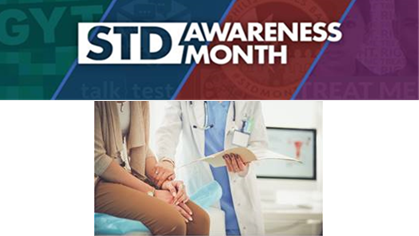April is Sexually Transmitted Disease Awareness Month, a time to raise awareness and take action to prevent, test for, and treat STDs.
The highlighted links below from the Centers for Disease Control and Prevention will provide information on evaluating an individual’s sexual history, in addition to overall information on being educated about the prevention of STDs.
Here is more information from the National Coalition for Sexual Health.
https://nationalcoalitionforsexualhealth.org/
https://www.fiveactionsteps.org/
OTHER VIDEOS FOR THIS EDUCATIONAL MONTH:
CLICK HERE for more on Illinois’ Getting to Zero Initiative
CLICK HERE for Testing Guidelines for CLINICAL CARE PROVIDERS
CLICK HERE for Instructional Video for Ladies
Antibiotic-Resistant Gonorrhea
https://www.youtube.com/watch?v=iFwlnljV2Go#action=share
- Gonorrhea is the second most commonly reported notifiable disease in the United States.
- There are nearly 400,000 reported cases of gonorrhea per year, yet CDC estimates 820,000 new infections may actually occur each year.
- Thirty percent of new gonorrhea infections each year are resistant to at least one drug.
- In 2006, CDC had five recommended treatment options for gonorrhea—now the U.S. has only one option remaining.
Gonorrhea has progressively developed resistance to the antibiotic drugs prescribed to treat it. Following the spread of gonococcal fluoroquinolone resistance, the cephalosporin antibiotics have been the foundation of recommended treatment for gonorrhea. The emergence of cephalosporin-resistant gonorrhea would significantly complicate the ability of providers to treat gonorrhea successfully, since we have few antibiotic options left that are simple, well-studied, well-tolerated and highly effective. It is critical to continuously monitor antibiotic resistance in Neisseria gonorrhoeae and encourage research and development of new treatment regimens.
For females of reproductive age STD screening and treatment of infections, along with partner services, is imperative. Pregnancy status for females of reproductive age has become required information.

